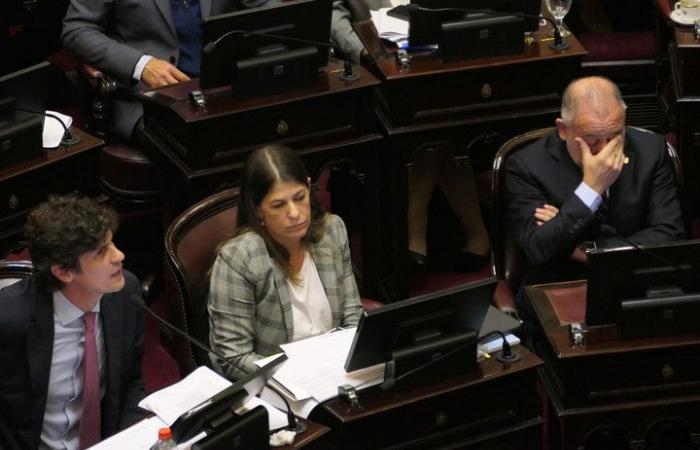“We must comply with the agreements, let’s not break the rules because it will get complicated”. That was the advice that a deputy left to the Chief of Staff, Guillermo Francosin the meeting that the leaders of the dialogue opposition had this week with representatives of the Government to refine the treatment schedule of the Bases Law and the fiscal package after the return with changes from the Senate.
The truth is that the notice did not have much effect on the coordinating minister because he brought the message to the meeting with his main allies in the Deputies to go for the original version of the fiscal package and gave a little more freedom for what may happen with the Bases Law, which prospered after several changes proposed by the dialogue senators during the committee’s treatment.
From the summit attended by Cristian Ritondo and Silvia Lospennato (PRO), Miguel Angel Pichetto (We Make the Federal Coalition), Rodrigo De Loredo (UCR), Juan Manuel López (Civic Coalition), Pamela Calletti (Federal Innovation), Gabriel Bornoroni ( LLA). Eduardo Falcone and Cecilia Ibánez (MID) had more doubts than before. The opposition expected Francos to come with a list of specific requests and that did not happen.
In the ranks of the dialogueists they avoided giving definitions and decided to take the long weekend to study what was approved in the Senate and meet on Tuesday. But there would be confidence to repeat what happened at the end of April when the Base Law was approved with 142 votes and the fiscal package with 140.
Francos ignored the agreements with the Senate
“There was no negotiation, Airlines pulled out of the privatizations because we did not have the numbers”, was the phrase that the Chief of Staff left to the deputies. It is worth remembering that both Aerolíneas Argentinas, Correo Argentino and the public media were removed from the privatization chapter at the beginning of last Wednesday’s session in the Senate. The decision had been interpreted as a signal to the radical senators and the federal blocs that during the committee’s treatment they requested that these companies be excluded from the sales plan.
A source close to the ruling party assured that “the Government wants to go for everything” and it is understood that the objective is to ratify the half-sanction of Deputies. This would not be well received by the dialogue blocs of the Senate that gave their support in the vote in general and in a large part of the particular one.
“If they are the new and good thing in politics and they want to change things, They should respect the commitments made in the Senate in the text of the lawOtherwise, they will lose all confidence in the treatment of laws and capacity for agreements in the future”he told Clarion an important opposition senator not K after learning of the ruling party’s intention to go for the half sanction.
Senators such as Edgardo Kueider and Guadalupe Tagliaferri gave their signature to the opinion based on some modifications that were made to the text approved by the Deputies. Even the Entre Ríos native faced strong pressure from provincial Peronism to support the proposal and The radical Pablo Blanco was received with an intimidating and violent escrache at the Río Grande airport, in Tierra del Fuego. “I told everyone that they were going to be screwed, that they should not let themselves be pressured, but they didn’t give me any thought,” said another opposition legislator.
The articles protected by the Senate
It must be clarified that several of the chapters were protected by the Senate by obtaining two-thirds in the vote in particular, a majority that is difficult to achieve in Deputies since 172 votes are needed, a number that is only achieved with the support of a Kirchnerism sector.
Among the issues that achieved the special majority are money laundering, which had modifications from the Senate; the controversial article 111, which aimed to eliminate tax extensions and modify the tax benefits scheme of Tierra del Fuego; and the increase in mining royalties, which go from 3 to 5%, which was requested by Santa Cruz residents José Carambia and Natalia Gadano.
On the other hand, in the case of the reversal of the Income and Personal Assets tax, they were rejected by a simple majority so they could be reintroduced in Deputies as well as the changes to the Large Investment Incentive Regime (RIGI), which senators modified to favor the promotion of the development of local production chains associated with large investment projects. The margin of action of suppliers of goods or services with imported merchandise is also limited while establishing a regime to hire local personnel and suppliers.
 Luis Juez, Guadalupe Tagliaferri and Martín Lousteau in the Senate session. PHOTO: ENRIQUE GARCIA MEDINA.
Luis Juez, Guadalupe Tagliaferri and Martín Lousteau in the Senate session. PHOTO: ENRIQUE GARCIA MEDINA.As an important pro-government operator in Congress said, in the Casa Rosada they will have to reflect on the consequences that the decision to insist on the half-sanction of Deputies may bring, especially taking into account that the next battle in the Senate will be to approve the specifications. of Ariel Lijo and Manuel García-Mansilla, the proposed candidates for the Supreme Court of Justice.
The Senate also has in the pipeline the project that promotes a new pension update formula, which has the half-sanction of Deputies, while in September, the Minister of Economy, Luis Caputo, must present his first Budget project that will be for the next anus.








